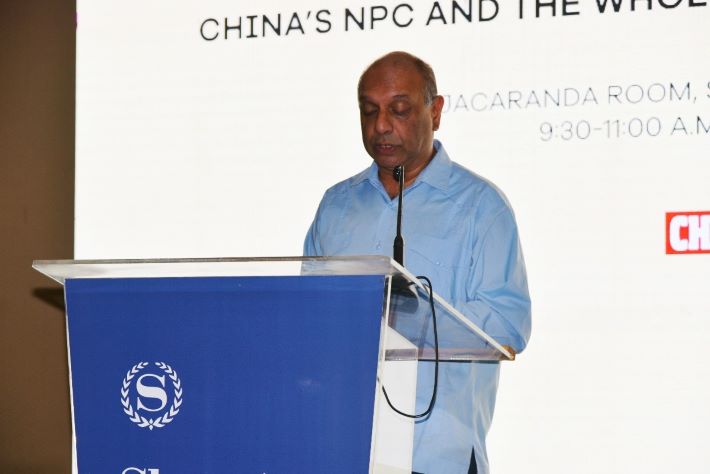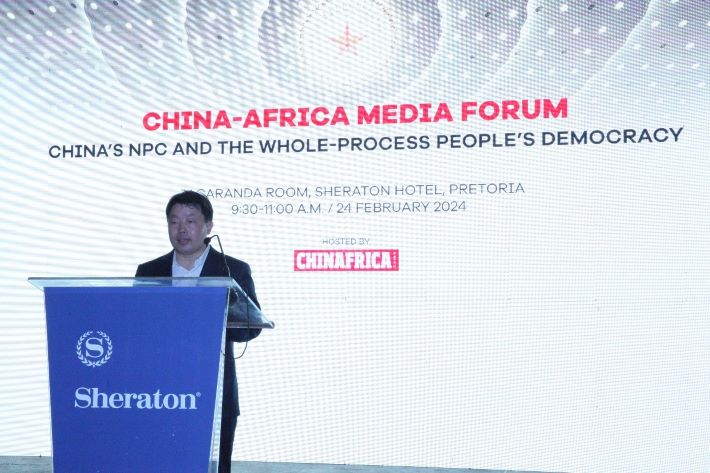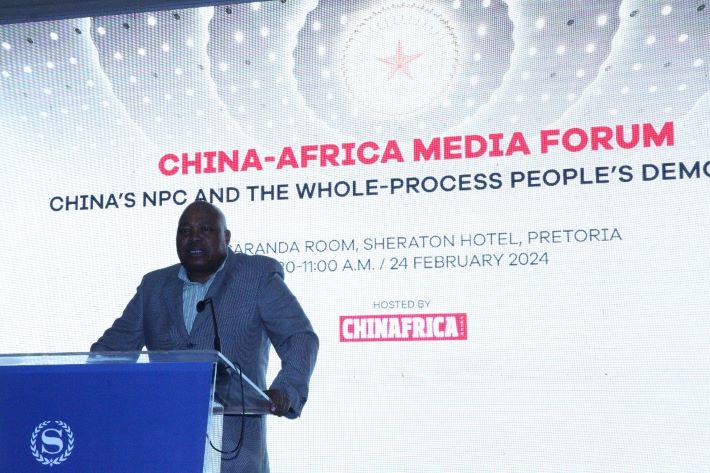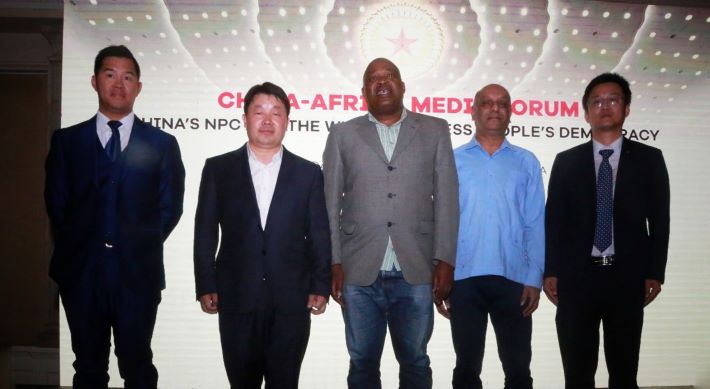|
||||||||||
| Home Nation World Business Opinion Lifestyle ChinAfrica Multimedia Columnists Documents Special Reports |
|
||||||||||
| Home Nation World Business Opinion Lifestyle ChinAfrica Multimedia Columnists Documents Special Reports |
| ChinAfrica |
| Democracy for Better Development |
| Chinese and South African scholar discuss China’s democracy before the opening of lianghui |
| Ni Yanshuo | Web exclusive ·2024-02-26 |
This year marks the 70th anniversary of the establishment of the National People’s Congress (NPC), China’s top legislature, and thus, this year’s national sessions of the NPC and the National Committee of the Chinese People’s Political Consultative Conference (CPPCC), which are commonly known in Chinese as lianghui, have aroused more attention in the world. The two sessions will open in Beijing on 5 March and 4 March respectively.
On 24 February, the China-Africa Media Forum: China’s NPC and Whole-Process People’s Democracy was held in Pretoria, South Africa. Chinese and South African experts and scholars elaborated China’s NPC system and its whole-process people’s democracy.

Qin Xiaoshun, professor at the University of South Africa, speaks at the forum (TAN MINGXIA)
In his speech, Qin Xiaoshun, professor at the University of South Africa, noted that the whole-process people’s democracy suits China’s national conditions, which can be seen during the lianghui. During the sessions, NPC deputies and CPPCC National Committee members put forward their motions and proposals for discussion, and these motions and proposals will be forwarded to related departments for handling. This fully demonstrates the functioning of China’s whole-process people’s democracy.
He noted that the whole-process people’s democracy is not a new concept. It is actually followed by China in the past years in governing the country. It requires broader public participation, higher efficiency and more effective government response.

Kirtan Bhana, director of the Diplomatic Society, speaks at the forum (TAN MINGXIA)
According to Kirtan Bhana, director of the Diplomatic Society of South Africa, the lianghui is an important event in China’s political life. Chinese people exercise their power of governance through putting forward plans for national development and approving budgets. These plans are then responded by related government departments. Led by the Communist Party of China, the Chinese people have discovered the democracy that suits China’s condition, that is, whole-process people’s democracy, based on which, China has made important achievements in various aspects in the past decades.
According to him, 30 years ago, South Africa also chose the democracy that suits the country. In May this year, South Africa will have general election, where South African people will exercise their right to push the country’s development. In this regard, South Africa’s parliament should enhance exchanges with China’s NPC.

Ni Yanshuo, chief reporter of the Africa Bureau of the CICG Centre for Europe and Africa, speaks at the forum (NI BOWEN)
In his speech, Ni Yanshuo, chief reporter of the Africa Bureau of the CICG Centre for Europe and Africa, noted that different countries choose the forms of democracy according to their different conditions. China and South Africa adopted different forms of democracy for the same purpose: wellbeing of the people.
Chinese President Xi Jinping has said that democracy is not an ornament to be used for decoration; it is to be used to solve the problems that the people want to solve. Under the whole-process people’s democracy, China has grown from a poor country to the world’s second-largest economy in several decades, and has now abolished absolute poverty. Today, Chinese people do not need to worry about putting food on the table, clothing, compulsory education, basic medical services and housing.

Mondi Hlatshwayo, professor at the University of Johannesburg, speaks at the forum (NI BOWEN)
According to Mondi Hlatshwayo, professor at the University of Johannesburg, China’s whole-process people’s democracy is the broadest, most genuine and most effective socialist democracy. Lianghui is a good example. The participants include not only government officials, but also representatives from academia, technology sectors, education and other circles. Most importantly, there are many representatives from grassroots communities and ethnic minorities. This is real whole-process participation and whole-process supervision.
The media forum was held just before the opening of the lianghui, and attracted keen interest from the South African people. Vuma Tiego, international relations project manager at the National School of Governance of South Africa, extended her congratulations to the forum. She noted that this forum can help government departments in South Africa to know about China’s experience in governance, so as to provide better public services and administration. “I hope we could have more opportunities to learn about China’s development,” she said.

(Left to right) Moderator Liao Ping, Ni Yanshuo, Mondi Hlatshwayo, Kirtan Bhana and Qin Xiaoshun pose for a photo after the forum (WANG XI)
| About Us | Contact Us | Advertise with Us | Subscribe |
| Copyright Beijing Review All rights reserved 京ICP备08005356号-5 京公网安备110102005860号 |